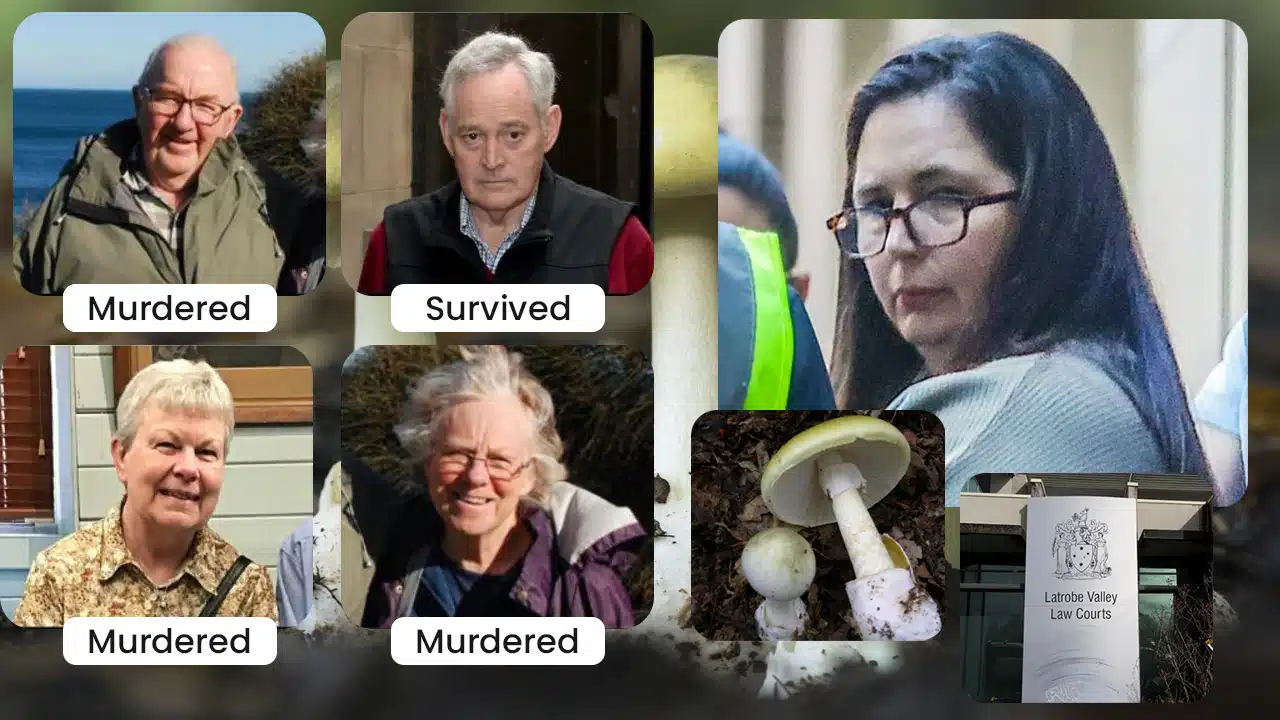Erin Patterson Mushroom Murder Trial: Shocking Details and Legal Implications
The high-profile trial of Erin Patterson has captured national attention, raising questions not only about guilt and innocence but about how Australia’s legal system handles complex criminal allegations. At the centre of the case is a tragic family lunch that ended in the deaths of Don and Gail Patterson and Heather Wilkinson, following a meal allegedly contaminated with death cap mushrooms.
With the only survivor, Ian Wilkinson, hospitalised for weeks, the case has triggered widespread media coverage, debates on food safety, and public discussions about circumstantial evidence in homicide charges. As the jury prepares to decide Erin Patterson’s fate, legal experts and the public alike watch closely.
The Allegations Against Erin Patterson
The prosecution’s narrative is chilling. Patterson is accused of intentionally poisoning her former in-laws by serving a beef Wellington containing foraged death cap mushrooms. Prosecutors argue she lured her guests by falsely claiming to have cancer, served herself a separate safe portion, and later attempted to cover up her actions by disposing of a food dehydrator and wiping her phone remotely while in police custody.
According to the prosecution, these acts point to “a sinister deception” — an effort not just to harm, but to mask intent. If convicted, Patterson could face life imprisonment under section 19A of the Crimes Act 1900 (NSW).
If you’re navigating a serious allegation, our Sydney criminal lawyers at Jameson Law can provide strategic defence and legal protection across all NSW courts.
The Defence Argument
The defence claims Patterson’s actions were a tragic accident. She testified that she had purchased dried mushrooms from a local store, believing they were safe. She said she became sick after the meal, induced vomiting, and initially lied about her illness due to embarrassment — not malicious intent.
Her legal team pointed out that there is no forensic link between Patterson and the mushroom source. This brings the role of circumstantial evidence into the spotlight — a key point in serious criminal cases.
For more on how intent is proven in court, visit our resource on murder and manslaughter defence.
Understanding Circumstantial Evidence
This case hinges on circumstantial evidence — such as conflicting statements, alleged cover-ups, and indirect actions. In NSW, the law allows convictions based on this type of evidence, provided the jury is convinced beyond a reasonable doubt.
Learn how ‘beyond reasonable doubt’ is applied in practice by judges and juries in criminal trials.
Prosecution Evidence and Legal Strategy
- Purchase and disposal of a food dehydrator
- Alleged deletion of phone data while in custody
- Discrepancy between the meal Patterson ate and what was served to others
- False cancer claim used to invite guests
The prosecution argues these actions were part of a premeditated plan. But no eyewitness saw her collect or use wild mushrooms. The absence of direct proof makes the case legally challenging.
In similar situations, it’s critical to have the support of an experienced criminal defence solicitor early in the process.
Forensic Complexity in Mushroom Poisoning Cases
Forensic experts were unable to find direct traces of mushrooms in the meal remnants. This is common in poisoning cases, especially involving Amanita phalloides, which deteriorate rapidly. Without clear lab results, the court must assess intent from behavioural patterns.
Cases like these underline the value of expert legal advice. At Jameson Law, our team includes criminal defence lawyers in Sydney who understand the pressure and nuance involved in circumstantial trials.
Legal Standards and Jury Responsibility
In criminal trials, jurors must apply the principle of reasonable doubt. They cannot convict based on suspicion or probability alone. The case has become a teaching moment in legal forums and university classrooms about the balance between emotional narratives and evidentiary rigour.
The jury in this case must also consider whether Patterson’s inconsistent statements stem from guilt — or simply fear and trauma. As noted in NSW judicial commentary, “a lie does not automatically imply guilt.”
Potential Sentencing if Convicted
If Patterson is found guilty of murder, she faces a life sentence. For manslaughter, the penalties are still severe, but the court would likely consider factors like remorse, cooperation, and absence of prior offences. Sentencing in NSW is outlined by the NSW Sentencing Council.
Sentencing is also shaped by submissions from both the Crown and the defence. Jameson Law regularly handles sentencing advocacy and can advise clients on mitigating and aggravating factors under NSW law.
Broader Impact on Public Policy
This case has led to renewed awareness campaigns around mushroom safety. According to Food Standards Australia, individuals should never consume wild mushrooms unless identified by a qualified mycologist.
Community health organisations, like HealthDirect and RCH Melbourne, have released educational materials since the incident, stressing the severity of mushroom poisoning in both adults and children.
Legal Representation in High-Stakes Criminal Cases
Criminal charges of this nature can affect every part of a person’s life. Beyond possible imprisonment, there is reputational damage, psychological stress, and financial hardship. Anyone in this situation should seek urgent advice from a trusted criminal lawyer in Sydney.
Jameson Law offers assistance in a range of serious criminal matters, including:
- Assault charges
- Domestic violence allegations
- Fraud offences
- Drug possession and supply
- Criminal appeals
Our team brings empathy, precision, and deep knowledge of court procedure to every case.
Key Takeaways From the Mushroom Murder Trial
- This case is built entirely on circumstantial evidence
- There is no direct forensic proof of intentional poisoning
- Intent remains the central legal question
- If convicted, Patterson faces life imprisonment
- The jury must decide based on evidence — not emotion
For more on the differences between murder and manslaughter in NSW, visit our detailed guide.
Need Legal Advice?
If you or someone close to you is facing criminal allegations, don’t wait until charges escalate. Contact our criminal law team at Jameson Law to schedule a confidential consultation.
You can also explore NSW criminal law procedures via the NSW Criminal Justice System portal or check your rights through Legal Aid NSW.
Justice is about more than verdicts — it’s about understanding, preparation, and representation. Jameson Law is here to walk that journey with you.













